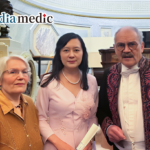
Editor's Note: Global breast cancer researchers are tackling cutting-edge questions to inform clinical trial design and guide future treatment decisions. At the 2024 San Antonio Breast Cancer Symposium (SABCS), an internationally renowned panel of experts explored two of the most pressing topics in translational medicine—how to define triple-negative breast cancer (TNBC) and the development of tumor-agnostic therapies.The Translational Medicine Controversies session was held on Wednesday, December 11, from 2:00 PM to 3:00 PM (CST) at the Henry B. Gonzalez Convention Center, “Stars at Night Ballroom 1-2.” Dr. Antonio Wolff, professor of oncology at Johns Hopkins University and interim director of the Breast and Gynecologic Malignancies Program at the Sidney Kimmel Comprehensive Cancer Center, moderated the session.
“These topics may not be inherently controversial, but the rapid advancements in these fields bring challenges and raise many questions,” said Dr. Wolff. “These include how we conduct clinical trials in oncology and how we treat patients diagnosed with breast cancer. We had an outstanding group of speakers discussing the latest research in these areas and how that research translates into clinical practice.”
Topic 1: Defining Triple-Negative Breast Cancer
Panelists:
- Dr. Rebecca Dent, Senior Consultant and Director of Medical Oncology at the National Cancer Centre Singapore, and Associate Professor at Duke-NUS Medical School.
- Dr. Charles Perou, Professor of Genetics at the University of North Carolina at Chapel Hill, Co-Director of the Computational Medicine Program, and Director of Bioinformatics and Breast Cancer Research at the Lineberger Comprehensive Cancer Center.
“This topic is critical because we diagnose and make initial clinical decisions based on traditional breast cancer phenotypes,” explained Dr. Wolff. “These are primarily defined by three immunohistochemical biomarkers—estrogen receptor (ER), progesterone receptor (PR), and HER2 receptor expression, along with various tumor proliferation indicators.”
These biomarkers help clinicians identify tumors and guide treatment decisions based on prognosis and potential therapeutic benefit, whether in early-stage or metastatic settings, for ER-positive, HER2-positive, or TNBC cases.
“TNBC is particularly challenging because labeling it as ‘triple-negative’ acknowledges that we don’t fully understand what it is,” said Dr. Wolff. “We know these tumors are not driven by ER or HER2 pathways, but we lack a clear understanding of what does drive them.”
The panelists discussed several emerging therapeutic targets and treatments beyond traditional cytotoxic agents, as well as additional biomarkers that could improve tumor identification and enable more personalized treatment approaches for patients often broadly categorized under TNBC.
Topic 2: Tumor-Agnostic Drug Development
Panelists:
- Dr. Funda Meric-Bernstam, Chair of Investigational Cancer Therapeutics at MD Anderson Cancer Center and Medical Director of the Institute for Personalized Cancer Therapy.
- Dr. Fabrice André, Director of Breast Cancer Research at Gustave Roussy Cancer Center, Professor of Medicine at Paris-Saclay University, and Advisor in Medical Oncology.
“The concept of tumor-agnostic drug development represents an evolution in our understanding of cancer,” said Dr. Wolff. “It complements the historical role of anatomy in medical education, clinical research, and the organization of subspecialty patient care, where cancers have traditionally been treated based on their organ of origin.”
This rapidly evolving area of research has demonstrated the therapeutic potential of targeting tumor and microenvironment interactions, as seen with drugs like immune checkpoint inhibitors such as pembrolizumab. These approaches are less dependent on tumor phenotype or the anatomical and histological classification of primary tumors.
“These findings suggest that many molecular events driving cancer progression are shared across different tumor types,” Dr. Wolff noted. “This could inform treatments that go beyond traditional diagnoses like breast, pancreatic, or ovarian cancer.”
He explained that tumors with similar molecular profiles, regardless of their tissue of origin, could theoretically be treated with the same therapies.
“The challenge now is determining what additional tissue, imaging, or blood tests clinicians and researchers should consider when treating patients or designing clinical trials,” said Dr. Wolff. “These tools should complement expert pathology to help design more relevant and informative trials and ultimately guide better clinical decisions for patients.”
Conclusion
The Translational Medicine Controversies session shed light on key challenges in defining TNBC and advancing tumor-agnostic therapies. These discussions highlighted the importance of refining tumor classification and broadening therapeutic approaches to improve patient outcomes.
By embracing molecular and biological insights, researchers and clinicians aim to develop personalized treatments, improve clinical trial designs, and address the complexities of cancer beyond traditional paradigms. As the field continues to evolve, these advancements promise to redefine breast cancer care and set new standards for precision oncology.


